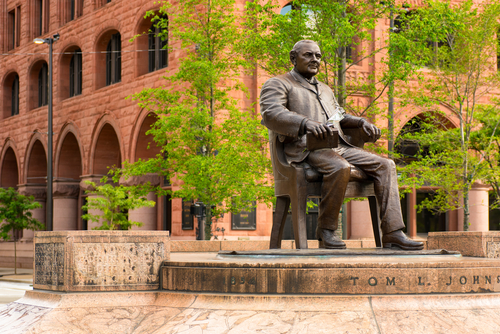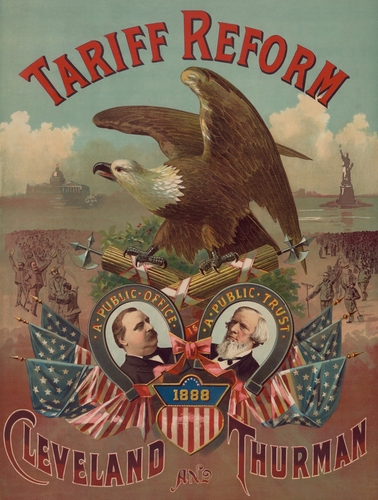
America faced many problems as they transitioned from the 19th to the 20th century. As a result, progressive thinkers and politicians focused on issues they believed to be unfair. These included such things as improving workers' rights, conserving natural resources, uplifting the urban poor, protecting consumers from tainted products, and bringing about women's suffrage.
Progressives and reformers worked with journalists and authors to expose racism, worker exploitation, and environmental issues. They focused on making positive changes for the entire country.

A 1916 statue of Tom L. Johnson, the popular progressive mayor of Cleveland from 1901 to 1909, occupies a prominent new location in the public square.
Many Americans called for reform in the late 1800s. The reformers had many different goals. Progressive reformers focused on urban problems, government, and business. They claimed that government and big business were taking advantage of the American people rather than serving them. Political machines—powerful organizations linked to political parties—controlled local government in many cities. In each ward, or political district within a city, a machine representative controlled jobs and services. This representative was the political boss. The bosses gained votes for their parties by doing favors for people, such as offering turkey dinners and summer boat rides, providing jobs for immigrants, and helping needy families. A political boss was often a citizen’s closest link to local government.
Although they did help people, many bosses were dishonest. Corrupt politicians found numerous ways to make money. They accepted bribes from tenement landlords in return for overlooking violations of city housing codes. They received campaign contributions from contractors hoping to do business with the city. They also accepted kickbacks. A kickback is an arrangement in which contractors padded the amount of their bill for city work and paid, or “kicked back,” a percentage of that amount to the bosses. Some politicians used their knowledge of city business for personal profit. A person who knew where the city planned to build a road could buy land there before the route became public knowledge. Later the land could be sold for a huge profit. One of the most corrupt city bosses, William M. Tweed, known as Boss Tweed, headed New York City’s Democratic political machine in the 1860s and 1870s.
To break the power of political bosses, reformers founded organizations such as the National Municipal League in Philadelphia. These groups worked to make city governments more honest and efficient. Cities troubled by poor management or corruption tried new forms of government. After a tidal wave devastated Galveston, Texas, in 1900, the task of rebuilding the city overwhelmed the mayor and city council. Galveston’s citizens persuaded the Texas state legislature to approve a new charter that placed the city government in the hands of five commissioners. The new commission efficiently rebuilt the city. By 1917 commissions governed nearly 400 cities. Many other cities, mostly small ones, hired professional city managers.
One successful civic reformer was Tom Johnson, mayor of Cleveland, Ohio, from 1901 to 1909. He battled corporations and party bosses to lower streetcar fares, improve food inspections, and build parks. Because of Johnson’s reforms, Cleveland became known as the best governed city in the United States.

An 1885 illustration shows President Grover Cleveland and his cabinet officers struggling to push and pull the Democratic donkey labeled "Bourbon Democracy" into a stable labeled "Reform Stables." On the donkey's hooves, acting as brakes, are the faces of John Kelly, labeled "Spoils System"; Charles A. Dana, labeled "Anti-Civil Service Reform"; "Mclaughlin", and "J.R. M'Lean."
The spoils system, rewarding political supporters with jobs and favors, had been common practice since the time of Andrew Jackson. Whenever a new president came to power, job seekers flooded the nation’s capital. The spoils system, also called patronage, existed at all levels of government and led to numerous abuses. Many who received government jobs were not qualified. Some were dishonest. Presidents Rutherford B. Hayes and James Garfield wanted to change the spoils system. Hayes tried to do this by reforming the civil service, the body of nonelected government workers, but neither the Democratic nor the Republican Party supported his efforts. Garfield also hoped to reform the civil service. He believed that people should be appointed to government jobs not as a reward for political support but because of their qualifications. Garfield took office in 1881 but was assassinated by an unsuccessful office seeker before he could launch his reforms.
When Vice President Chester A. Arthur succeeded Garfield, he tried to end the spoils system. In 1883, Congress passed the Pendleton Act, which established the Civil Service Commission to set up competitive examinations for federal jobs. Applicants had to demonstrate their abilities in this examination. By 1900 the commission controlled the hiring of many federal employees.

An 1888 presidential election Democratic campaign poster promising tariff reform
During the late 1800s, many Americans came to believe that trusts, or combinations of companies, were becoming too large. They believed these trusts had too much control over the economy and the government. This public concern led to new laws regulating big business. In 1890, Congress passed the Sherman Antitrust Act, the first federal law to control trusts and monopolies. Supporters of the law hoped it would keep trusts from limiting competition. During the 1890s, however, the government rarely used the Sherman Act to curb business. Instead, it applied the act against labor unions, claiming that union strikes interfered with trade. Not until the early 1900s did the government win cases against trusts by using the Sherman Act.
The railroads functioned as an oligopoly, a market structure in which a few large companies control the prices of the industry. Reformers called for regulations on railroad rates, but the Supreme Court ruled that only Congress could enact legislation to regulate commerce that crossed state lines. So, in 1887, Congress passed the Interstate Commerce Act, which required railroads to charge “reasonable and just” rates and to publish those rates. The act also created the Interstate Commerce Commission, or ICC, to supervise the railroad industry and, later, the trucking industry.
Reformers also wanted to lower tariffs. Many people believed that high tariffs led to higher prices for goods. In 1890, the Republicans raised tariffs sharply to protect American businesses from international competition. Voters showed their opposition to high tariffs by sending many Democrats to Congress. Grover Cleveland, who became president in 1893, also supported lower tariffs.

John Dewey
Urban thinkers also began to convince people to embrace change. Henry George attracted many followers by blaming inequalities in wealth on land ownership. In his 1879 work, Progress and Poverty, he suggested that profits made from land sales be taxed at a rate of 100 percent. Edward Bellamy peered into the future in his 1888 novel, Looking Backward. In The Theory of the Leisure Class, Thorstein Veblen cited countless cases of "conspicuous consumption." Wealthy families spent their riches on acquiring European works of art or fountains that flowed with champagne. Surely, he argued, those resources could be put to better use.
Leading this new era of reform was a fundamental shift in philosophy away from Social Darwinism. Why accept hardship and suffering as simply the result of natural selection? Humans can and have adapted their physical environments to suit their purposes. Individuals need not accept injustices as the "law of nature" if they can think of a better way. Philosopher William James called this new way of thinking, "pragmatism." His followers came to believe that an activist government could be the agent of the public to pursue the betterment of social ills. The most prolific disciple of James was John Dewey. Dewey applied pragmatic thinking to education. Rather than having students memorize facts or formulas, Dewey proposed "learning by doing." The progressive education movement begun by Dewey dominated educational debate the entire 20th century.

The Seventeenth Amendment to the U.S. Constitution; image from the National Archives and Records Administration
In the early 1900s, progressives backed several reforms designed to increase the people’s direct control of the government. Robert La Follette led Wisconsin’s reform-minded Republicans. “Fighting Bob,” as he was called, won the support of farmers and workers with his fiery attacks on big business and the railroads. While governor, La Follette brought about reforms such as improving the civil service. His greatest achievement, however, was reforming the state electoral system. Candidates for general elections in Wisconsin had been chosen at state conventions run by party bosses. La Follette introduced a direct primary election, allowing the state’s voters to choose their party’s candidates. Reformers in other states copied this “Wisconsin idea.”
The state of Oregon also made important changes in the political process to give voters more power and to limit the influence of political parties. The reforms in Oregon included a direct primary election and the initiative, the referendum, and the recall. The initiative allowed citizens to place a measure or issue on the ballot in a state election. The referendum gave voters the opportunity to accept or reject measures that the state legislature enacted. The recall enabled voters to remove unsatisfactory elected officials from their jobs. These reforms were called the Oregon System. Other western states soon adopted the reforms.
Progressives also changed the way United States senators are elected. The Constitution had given state legislatures the responsibility for choosing senators, but party bosses and business interests often controlled the selection process. Progressives wanted to give the people an opportunity to vote for their senators directly. Support for this idea grew. In 1912, Congress passed the Seventeenth Amendment to the Constitution to provide for the direct election of senators. Ratified in 1913, the amendment gave the people a voice in selecting their representatives.
Question
Who were the urban, Northeastern, educated men and women who worked for reform in the U.S.?
